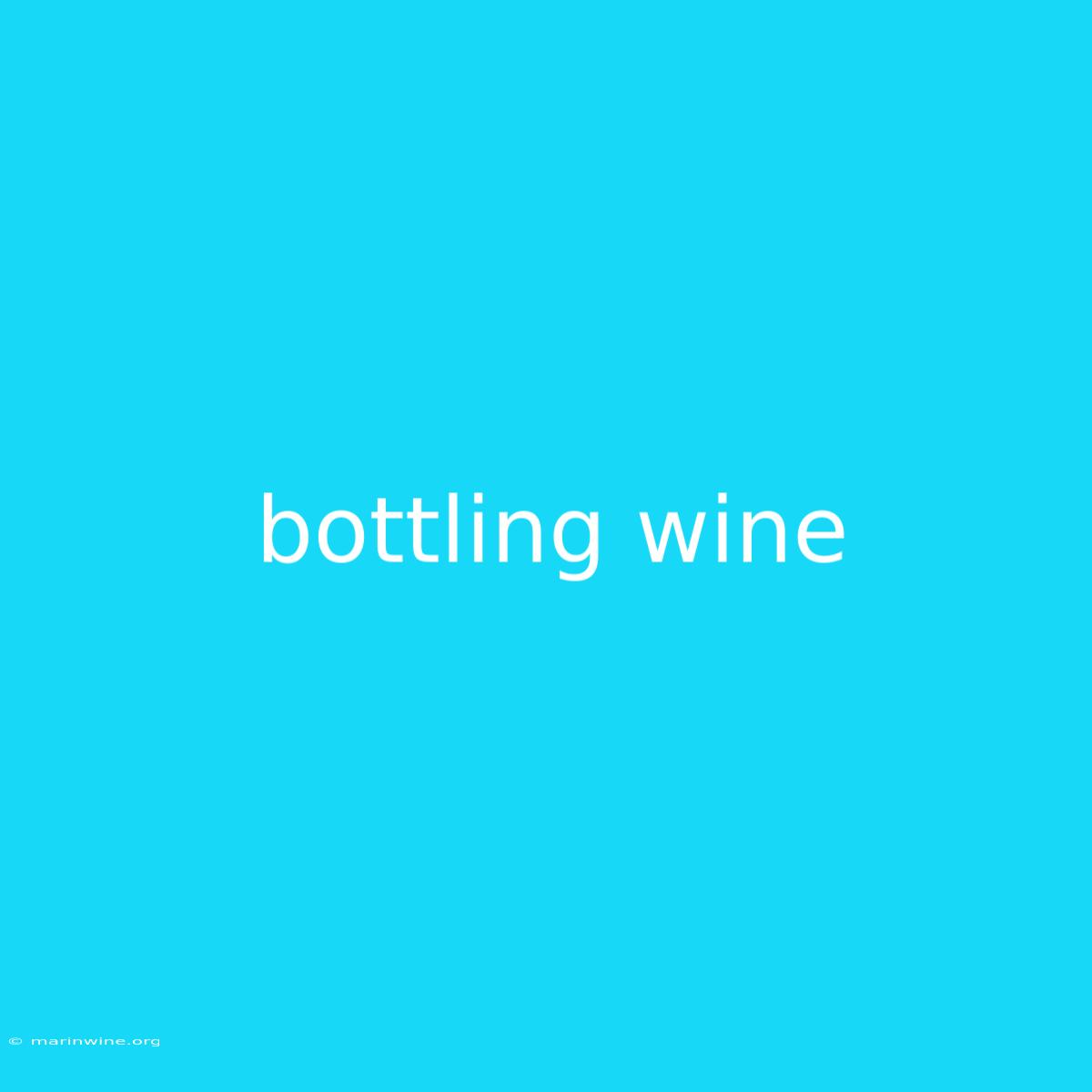The Art and Science of Bottling Wine: Unveiling the Secrets Behind a Perfect Bottle
Have you ever wondered what happens to wine after it's fermented? It's not simply poured into a bottle and shipped off to the store! The process of bottling wine is a crucial step, transforming a liquid into a finished product that's ready to enjoy.
Why It Matters: Bottling is the final stage of winemaking, where the wine is preserved, protected, and prepared for consumption. It requires precision, skill, and an understanding of how the wine will evolve in the bottle. Understanding the process can enhance your appreciation for the wines you purchase.
Key Takeaways of Bottling Wine:
| Key Takeaway | Description |
|---|---|
| Bottling is a crucial stage of winemaking. | It determines the wine's long-term quality and preservation. |
| Bottling methods have evolved over time. | From traditional cork to modern screwcaps, different techniques impact the wine's aging potential. |
| Wine undergoes changes in the bottle. | This includes oxidation, maturation, and development of flavors and aromas. |
Bottling Wine: A Step-by-Step Exploration
Bottling is a multi-faceted process, beginning with preparation and culminating in the final sealing and labeling of the bottle.
Preparing for Bottling
The wine must be meticulously prepared before bottling. This involves:
- Clarification and Filtration: Removing any remaining solids like yeast or grape particles to ensure a clear, stable wine.
- Sulfur Dioxide Addition: This acts as a preservative, preventing oxidation and microbial growth.
- Final Blending: If necessary, different lots of wine are blended to achieve the desired taste profile.
The Bottling Process
The actual bottling process involves several key steps:
- Filling: The wine is carefully filled into bottles, often using a filling machine that ensures precise volumes.
- Capping: The bottles are sealed with a cork or a screwcap, preventing oxygen from spoiling the wine.
- Labeling: The bottles are labeled with information about the wine, such as the producer, vintage, and varietal.
Bottling Methods: Tradition vs. Innovation
The choice of bottling methods influences the wine's aging potential and final character.
Cork: Traditional corks are made from the bark of cork oak trees. They provide a breathable seal, allowing for a gradual oxidation process that contributes to the wine's aging.
Screwcaps: A modern alternative, screwcaps are airtight and provide a consistent seal, ensuring that the wine remains consistent over time.
The Evolution of Wine in the Bottle
Once bottled, wine continues to evolve and develop. This process is influenced by:
- Oxidation: A gradual oxidation process occurs through the cork or screwcap, affecting the wine's color, aroma, and flavor profile.
- Maturation: The wine's tannins soften, fruit flavors develop, and the wine's complexity increases.
Connecting the Dots: Bottling and Wine Quality
Bottling plays a crucial role in shaping the final quality of a wine. By understanding the process, you can appreciate the care and attention to detail that goes into producing a bottle of wine.
Exploring the Connection: Bottling and Wine Defects
While bottling is a crucial step, potential risks exist. Here's how to understand them:
- Oxidation: Excessive exposure to oxygen can lead to "oxidized" wine, characterized by browning, a stale aroma, and a flattened flavor profile.
- Reduction: Insufficient oxygen exposure can result in "reduced" wine, exhibiting aromas of sulfur and rubber.
These defects can be mitigated through proper bottling practices and careful handling of the wine.
Bottling: A Journey of Flavor and Expertise
The journey of wine, from vineyard to bottle, is a complex and rewarding one. Bottling marks the culmination of this journey, ensuring that the wine is ready for enjoyment.
FAQ for Bottling Wine
Q: How long can wine stay in the bottle?
A: The aging potential of wine depends on the grape variety, the winemaking style, and the bottle's closure. Some wines improve with age, while others are meant to be enjoyed young.
Q: How does the bottle affect the wine?
A: The bottle's shape and color can influence the wine's aging and flavor profile. Green bottles offer more protection from light, while clear bottles allow for more light exposure.
Q: Why do some bottles have different closures?
A: The choice of closure (cork or screwcap) is influenced by the wine's style, aging potential, and the producer's preference.
Q: How can I tell if a bottle of wine is good?
A: Look for signs of oxidation, such as browning or a stale aroma. Check the bottle's label for any signs of damage or tampering.
Q: What should I do with a bottle of wine after opening it?
A: Wine can be stored in the refrigerator for a few days after opening. Use a vacuum stopper or wine preserver to minimize oxidation.
Tips by Bottling Wine
To enhance your understanding of bottled wine:
- Pay attention to the bottle's closure. Cork or screwcap? This reveals information about the wine's style and aging potential.
- Read the label carefully. Look for information about the producer, vintage, varietal, and region.
- Learn about the different stages of winemaking. Understanding the processes involved will deepen your appreciation for the finished product.
- Experiment with different wines. Explore wines from different regions, grape varieties, and producers.
- Store your wine properly. Maintain a cool, dark, and humid environment for optimal storage.
Summary by Bottling Wine
Bottling wine is a vital step in the winemaking process, transforming a fermented liquid into a final product that's ready to enjoy. Understanding the science and artistry behind this process can enhance your appreciation for the wines you choose.
Final Message: Next time you reach for a bottle of wine, take a moment to consider the journey it has taken. From vine to bottle, every stage has played a role in shaping the final flavor and quality.

